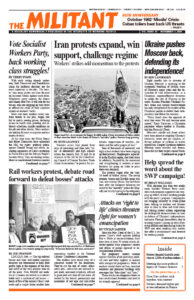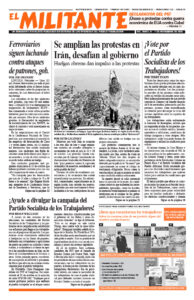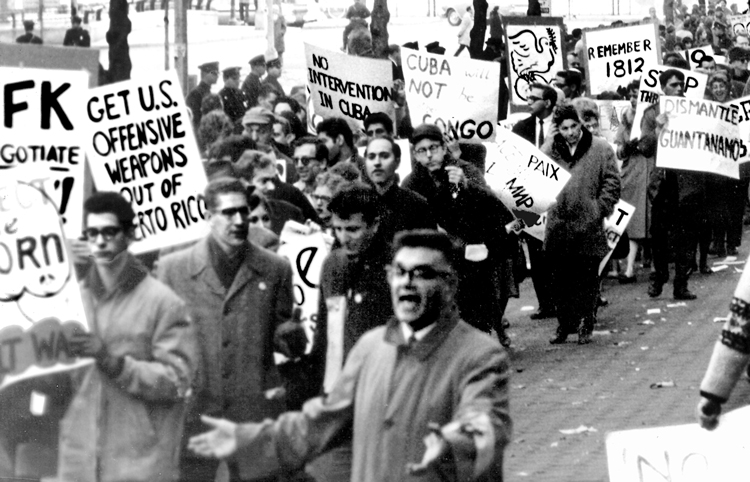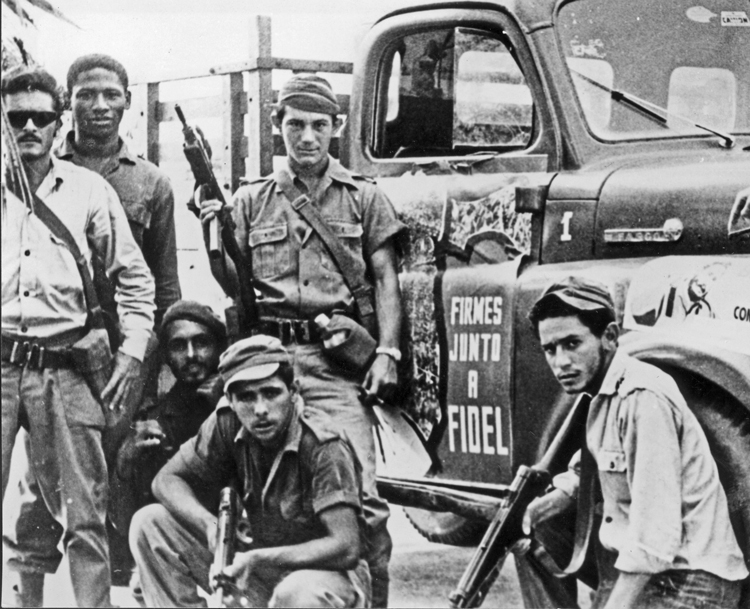Sixty years ago the U.S. rulers pushed the world to the brink of nuclear war in what is widely known as the Cuban Missile Crisis. Many books have been written presenting Washington’s and Moscow’s point of view on what occurred. But to get the facts from the viewpoint of the Cuban people you need to read October 1962: The ‘Missile’ Crisis as Seen from Cuba by Tomás Diez Acosta. He participated in the general mobilization of Cuba’s Revolutionary Armed Forces at the time.
Just days after Cuba’s armed forces, national militia and revolutionary police inflicted a massive defeat on 1,500 U.S.-backed mercenaries in less than 72 hours at the Bay of Pigs on April 19, 1961, Washington prepared further steps to overthrow Cuba’s revolutionary government by direct military action.
In May 1961 the CIA launched “Operation Patty,” putting in place plans to assassinate Fidel and Raúl Castro. It included carrying out a fake attack against the U.S.-occupied naval base at Guantánamo, aiming to provoke a confrontation.
Several months later the John F. Kennedy administration launched “Operation Mongoose.” This involved plans for sabotage, subversion and large-scale preparations for U.S. military intervention.
Under these conditions the Cuban government accepted a Soviet proposal for a defense pact between the two countries in July 1962, including the deployment of Soviet missiles in Cuba and some 42,000 Soviet troops. At the time the USSR was being ringed by U.S. strategic nuclear weapons, including nuclear-equipped Jupiter missiles in Turkey.
Fidel Castro argued that the installation of missiles in Cuba should be preceded by a public treaty. But Soviet Premier Nikita Krushchev rejected this, insisting on doing it secretly.
When U.S. spy planes recognized the missile sites under construction in mid-October 1962, Washington imposed a naval blockade of Cuba.
But the mobilization, determination and discipline of Cuba’s working people held off an impending U.S. invasion. On Oct. 26, at the height of the crisis, Kennedy asked the Pentagon for an estimate of the U.S. casualties that would result if he sent U.S. forces into Cuba. The Joint Chiefs of Staff informed him to expect 18,500 casualties in the first 10 days alone. Kennedy concluded the political price was too high and held off any direct U.S. military attack.
Two days later Krushchev told Kennedy he had ordered the removal of missiles from Cuba. The Cuban leadership only learned about this from a news report on Radio Moscow.
Washington then demanded the Cuban government accept “inspectors” to “verify” if the missiles had been withdrawn. Fidel Castro unequivocally rejected the request. “We have not surrendered nor do we intend to surrender any of our sovereign prerogatives to the Congress of the United States,” he told U.N. Secretary-General U Thant.
When asked in a 1992 NBC interview if he would accept the missiles if he had it to do so again, Castro said that knowing what he knows now of the Soviet handling of events, he would not.
At a Soviet-U.S.-Cuban conference on the missile crisis held in January 1992, Castro commented on Khrushchev’s demands. “We were not too pleased with the missiles, actually. If it had been a matter only of our own defense, we would not have accepted the emplacement of the missiles here.” He added, “because this would damage the image of the revolution. … The presence of the missiles would in fact turn us into a Soviet military base and that had a high political cost.”
Castro slandered as nuclear terrorist
The U.S. media continues to push the slander that Castro urged the Soviet Union to attack the U.S. with nuclear weapons. An Oct. 16 NPR article this year claimed Castro, “had written a letter to Khrushchev urging him to launch a preemptive nuclear strike.”
Thirty years ago this lie was featured in an Oct. 23, 1992, op-ed column in the New York Times by Fedor Burlatsky, one of Krushchev’s advisers. Five days later Socialist Workers Party leader Mary-Alice Waters wrote a letter to the Times to refute this. The paper refused to print it, but the Militant did, in its Dec. 18, 1992, issue.
“Fedor Burlatsky quotes Fidel Castro as writing in a cable to Nikita Krushchev during the October 1962 missile crisis that ‘I propose the immediate launching of a nuclear strike on the United States,’” Waters writes. “But neither the supposed quotation nor the Times’s rather eye-catching headline — ‘Castro Wanted a Nuclear Strike’ — squares with well-documented facts. The Cuban government itself published the relevant correspondence between Castro and Khrushchev almost two years ago. No document contains sentences Burlatsky ‘quotes,’ not any even resembling them.”
Castro sent a cable to Khrushchev on Oct. 26, saying, if “the imperialists invade Cuba with the goal of occupying it, the danger that that aggressive policy poses for humanity is so great that following that event the Soviet Union must never allow the circumstances in which the imperialists could launch the first nuclear strike against it.” (Emphasis added by Waters.)
Castro wrote again Oct. 31, Waters notes. “I did not suggest to you, Comrade Khrushchev, that the USSR should be the aggressor,” he said, “because that would be more than incorrect. It would be immoral and contemptible on my part.”
Sixty years later, the refusal of the Cuban people, led by their revolutionary government, to submit to the U.S. rulers’ demands remains a powerful example. They worked resolutely to defend Cuba’s sovereignty and pushed Washington back from the brink. All this and more is documented in Diez Acosta’s book.



